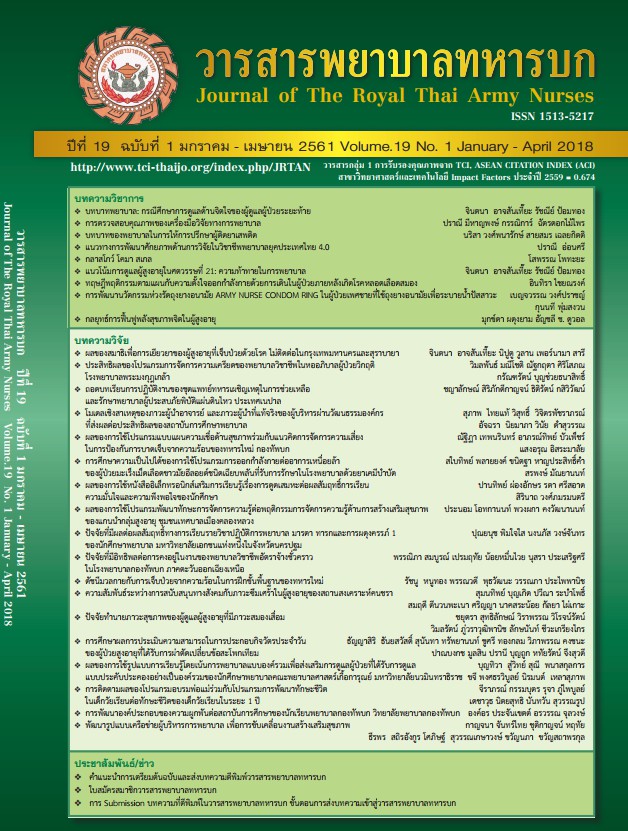ผลของการใช้โปรแกรมแบบแผนความเชื่อด้านสุขภาพ ร่วมกับแนวคิดการจัดการความเสี่ยง ในการป้องกันการบาดเจ็บจากความร้อนของทหารใหม่กองทัพบก
Abstract
การวิจัยกึ่งทดลองนี้มีวัตถุประสงค์เพื่อศึกษาผลของโปรแกรมแบบแผนความเชื่อด้านสุขภาพร่วมกับการจัดการความเสี่ยงในการป้องกันการบาดเจ็บจากความร้อนของทหารใหม่กลุ่มตัวอย่างเป็นทหารใหม่จำนวน 60 คน ที่เข้ารับการฝึกณ หน่วยฝึกของกองทัพบกในภาคใต้จำนวน 2 แห่งที่มีลักษณะคล้ายคลึงกันสุ่มเลือกเป็นกลุ่มควบคุมและกลุ่มทดลอง กลุ่มละ 30 คนทั้งนี้ ทั้งสองกลุ่มได้รับการป้องกันการบาดเจ็บจากความร้อนโดยแนวทางของกรมแพทย์ทหารบก ส่วนกลุ่มทดลองได้รับการป้องกันการบาดเจ็บจากความร้อนเพิ่มเติมจากโปรแกรม ซึ่งได้ออกแบบโดยใช้แนวคิดแบบแผนความเชื่อด้านสุขภาพ แนวคิดการจัดการความเสี่ยง และแนวคิดกระบวนการตลาดเชิงสังคม โดยเน้นการมีส่วนร่วมของกลุ่มตัวอย่างในทุกกิจกรรมของการสร้างความตระหนักและการปรับเปลี่ยนพฤติกรรม เป็นเวลา 2 สัปดาห์เก็บข้อมูลโดยใช้แบบสอบถามข้อมูลทั่วไป แบบบันทึกการปฏิบัติตัว และแบบวัดพฤติกรรมป้องกันการบาดเจ็บจากความร้อน ซึ่งมีค่าความเชื่อมั่นจากการทดสอบซ้ำ 0.96 วิเคราะห์ข้อมูลส่วนบุคคลโดยใช้สถิติเชิงพรรณนา (ความถี่ ร้อยละ ค่าเฉลี่ย และ ค่าเบี่ยงเบนมาตรฐาน) และเปรียบเทียบความแตกต่างของค่าเฉลี่ยคะแนนพฤติกรรมป้องกันการบาดเจ็บจากความร้อนภายในกลุ่มและระหว่างกลุ่มควบคุมและกลุ่มทดลองด้วยสถิติทีคู่และสถิติทีอิสระตามลำดับผลการวิจัย พบว่า กลุ่มทดลองที่ได้รับโปรแกรมแบบแผนความเชื่อด้านสุขภาพร่วมกับการจัดการความเสี่ยงในการป้องกันการบาดเจ็บจากความร้อนเพิ่มเติม มีค่าเฉลี่ยคะแนนพฤติกรรมป้องกันการบาดเจ็บจากความร้อนสูงกว่าก่อนได้รับโปรแกรมอย่างมีนัยสำคัญทางสถิติที่ระดับ .05 (t = -14.13) และสูงกว่ากลุ่มควบคุมอย่างมีนัยสำคัญทางสถิติที่ระดับ .05 (t = - 8.88) ดังนั้นโปรแกรมที่พัฒนาขึ้นในการวิจัยนี้จึงสามารถเพิ่มประสิทธิภาพในการส่งเสริมพฤติกรรมป้องกันการบาดเจ็บจากความร้อนในกลุ่มทหารใหม่ได้ และอาจสามารถนำไปประยุกต์ใช้ในกลุ่มอาชีพอื่นได้ โดยมุ่งเน้นการมีส่วนร่วมของผู้ที่มีส่วนเกี่ยวข้อง และคำนึงถึงบริบทของลักษณะการทำงานร่วมด้วย
The Effect of Health Belief Model and Risk Management Program for Heat Injury Prevention amongthe Royal Thai Army Recruits
The purpose of this quasi-experimental research study was to test the effect of theHealth Belief Model and Risk Management Program for heat injury prevention among the Royal Thai Army recruits. Samplingwas employed to select 60 recruitsfrom two army training centers in southern Thailand, who were then randomly allocated into one or other of 2 groups. Each group consisted of 30 recruits. The control group
received heat injury prevention based on guideline of the Royal Thai Army Medical Department and the experimental group additionally received the newly developed 2-weeks heat injury prevention program, which was based on the Health Belief Model,risk managementsteps and social marketing processes by focusing on participation in all activities for enhancing awareness and behavioral change. The data were collected using personal data form, personal practice records, and heat injury preventive behavior questionnaires (test-retest reliability, r = 0.96). Personal data were analyzed using descriptive statistics (frequency, percentage, mean and standard deviation). Comparisons of heat injury preventive behavior mean scores in each group and between both groups were conducted using paired t-test and independent t-test respectively. Compared to the pre-test mean score of heat injury preventive behavior, the experimental group participating in the Health Belief Model and Risk Management Program for heat injury prevention had a post-test mean score increased significantly .05 (t = -14.13). In addition, the post-test mean score was higher than that of the control group significantly.05 (t = -8.88). Therefore, the newly developed program was able to improve the heat injury preventive behaviors among the Royal Thai Army recruits. It should be applied to other groups by focusing on participation of the stakeholders and considering the context of working conditions.
Downloads
Downloads
Published
How to Cite
Issue
Section
License
บทความหรือข้อคิดเห็นใดใดที่ปรากฏในวารสารพยาบาลทหารบกเป็นวรรณกรรมของผู้เขียน ซึ่งบรรณาธิการหรือสมาคมพยาบาลทหารบก ไม่จำเป็นต้องเห็นด้วย
บทความที่ได้รับการตีพิมพ์เป็นลิขสิทธิ์ของวารสารพยาบาลทหารบก
The ideas and opinions expressed in the Journal of The Royal Thai Army Nurses are those of the authors and not necessarily those
of the editor or Royal Thai Army Nurses Association.






